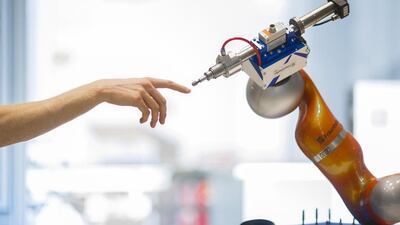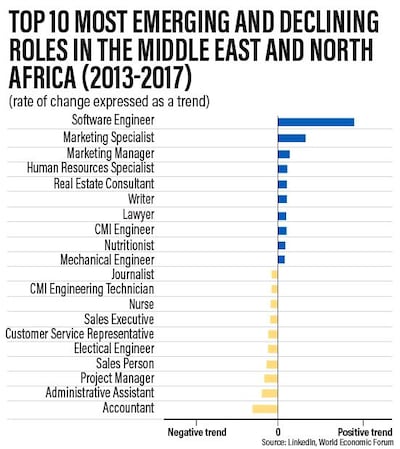Shifting trends in technology will create 58 million extra jobs by 2022 rather than replace humans in the workplace, a World Economic Forum report has said.
In a far more optimistic assessment of the future jobs market than has previously been put forward, the WEF's The Future of Jobs 2018 report found shifting technological trends, like automation and the adoption of artificial intelligence, would displace some jobs, but also create new ones.
In the first half of the year, the WEF surveyed chief human resources officers and top strategy executives from large multinationals across 12 industries and 20 developed and emerging economies for the report.
The findings this year are far more optimistic than the WEF's last report in 2015, when they forecast a net loss of 5.1 million jobs by 2020 as a result of disruptive labour market changes.
The WEF now says that while 75 million jobs may be displaced by a shift in the division of labour between humans, machines and algorithms, 133 million new roles may emerge “that are more adapted to this”.
_________________
Read more:
UAE tops Arab world in competitiveness
The National Future Forum live: Global trends shaping tomorrow
WEF's Sheila Warren: blockchain is the door to new digital reality
_________________
As it stands now, 71 per cent of work task hours are performed by humans, compared to 29 per cent by machines. By 2022, this is expected to shift to 58 per cent by humans and 42 per cent by machines.
“Companies need to complement their automation plans with comprehensive augmentation strategies," said Saadia Zahidi, head of the WEF's Centre for the New Economy and Society.
"For businesses to remain dynamic, differentiated and competitive in an age of machines, they must in fact invest in their human capital. There is both a moral and economic imperative to do so.
"Without proactive approaches, businesses and workers may lose out on the economic potential of the Fourth Industrial Revolution.”
The jobs forecast to be most redundant by 2022 are middle-skilled white collar roles, including: data entry, accounting and teller positions; however, there will be increased demand for human resource professionals, data analysts and scientists, software and app developers and social media specialists, particularly in the Middle East and North Africa.
The most-widespread technologies that employers say they are adopting include: big data, machine learning, the Internet of Things and app- and web-enabled markets.
Eighty-nine per cent of employers are likely to automate tasks, with 84 per cent saying they are likely to hire new staff with the skills to match these technologies.
Skills that are likely to be in demand in the Middle East by 2022 are critical thinking, creativity and emotional intelligence.
The report also found that the roles that increased in demand the most between 2013 and 2017 are software engineers and marketing specialists, while demand for accountants and assistants has declined the most.
There will be a significant shift in the quality, location, format and permanency of new roles, it said.
“Businesses are set to expand their use of contractors doing task-specialised work, engage workers in more flexible arrangements, utilise remote staffing and modify the locations where their organisation operates to ensure access to talent,” the report said.



